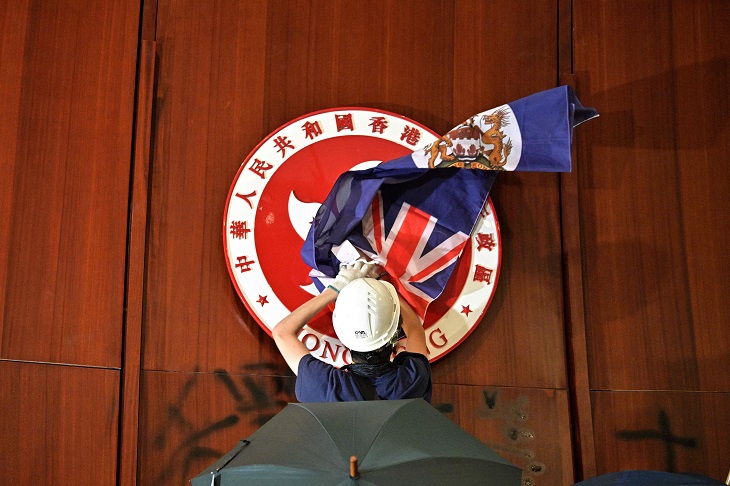During the dark years of Japanese occupation of Hong Kong, when Stanley Village was an internment camp for British nationals and the Peninsula Hotel was a Japanese officer’s club, the contemptuous phrase hissed, or whispered, of suspected collaborators was er guizi.
Then, as now, there were people who took preferments from the occupiers. When the British returned, collaborators were marked out, but not for punishment. They were usually too rich or too well known for their shady pasts to be made too public, but they were still shown up. One wealthy Hong Kong magnate, seen to have been too close to the Japanese, was never given the knighthood he longed for.
That old phrase has now been dusted off and given new meaning; ‘er guizi’ now refers to those in Hong Kong and China who are seen to be pro-Western, and thus must inevitably intend harm to China. Diplomats in Chinese embassies around the world keep trying, keep threatening, keep coercing, politicians, journalists, ‘influencers’ in all walks of life, to come around to Beijing’s way of thinking, the ‘wolf warrior’ diplomacy mode.
Reporters Without Borders estimate 127 journalists, many women, including the Australian Cheng Lei, have been arrested and held for months.
But now there appears to be a broader, inside-China wave of thinking, that seeks to convince ordinary Chinese that everything and everyone from the West is bad, and designed to somehow harm or violate Chinese norms.
In a Kafkaesque turn, any individual or organisation that is seen to be somehow corrupting or seeking to harm Chinese civil society is to be demonised and dealt with, and the media heads the list with foreign journalists considered to be spies and Chinese journalists as traitors.
The few NGOs based in China, such as Shanghai’s China House, (a global social enterprise organisation whose partners include WWF, Oxfam, John Hopkins University in the US, works on issues of sustainable development, and runs youth programs assisting African students in China and trying to shed light on buyers of illegal ivory), is now viewed with suspicion, targeted as running an agenda to disrupt Chinese society, and may have to end its work in China.
Rendu Ocean, an NGO that provides data on ocean pollution around China’s coastline, was accused by officials of anti-China activity, collecting data for spies.
There is a growing atmosphere of distrust and hostility towards anything seen as threatening to Chinese nationalism. An example of this would be the fanciful fears from bloggers broadcasting, for instance, that Western environmentalists calling for less meat on menus are following an agenda to deprive China of protein. During Mao’s Cultural Revolution, when ideological insanities brought about terrible starvation and death, Chinese society was trained to think of the West as hostile, an ever-constant threat that must be fought in every manifestation.
After Mao, as China slowly re-opened for business, old anti-China slogans were put to rest, and ‘running dogs’ were forgotten.
Bringing back an old label er guizi is an indication of China’s new directions.
Got something to add? Join the discussion and comment below.
Get 10 issues for just $10
Subscribe to The Spectator Australia today for the next 10 magazine issues, plus full online access, for just $10.


























Comments
Don't miss out
Join the conversation with other Spectator Australia readers. Subscribe to leave a comment.
SUBSCRIBEAlready a subscriber? Log in